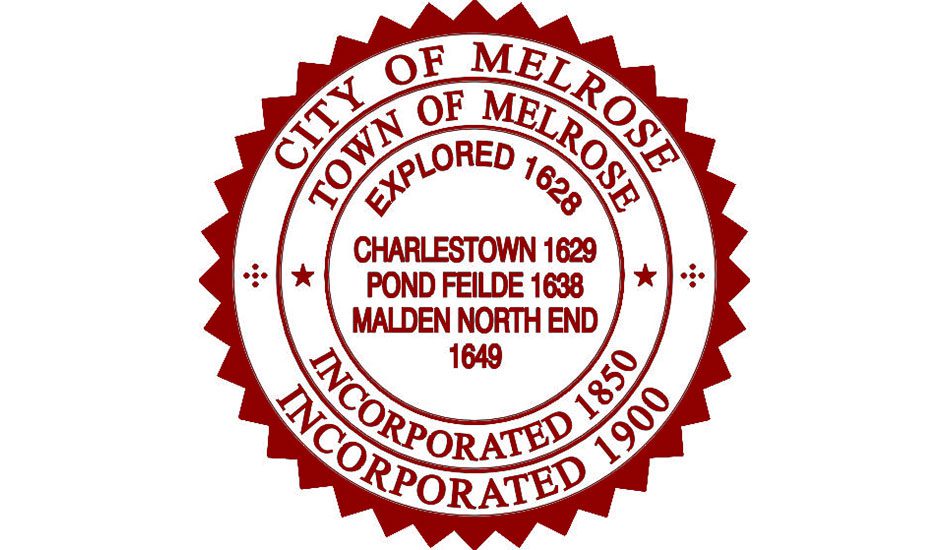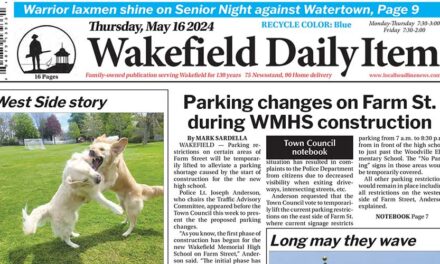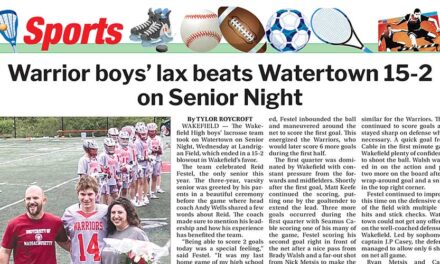This is the text of Mayor Jen Grigoraitis’ remarks during a joint City Council and School Committee meeting on Monday.
Good evening, Madam President, Madam Chair and the honorable members of the City Council and School Committee. First and foremost, thank you for being here and for your service to our shared community.
Tonight, I am coming before you in my first budget address as mayor. It is, as always, a great privilege to serve the city of Melrose and its residents, and to do so alongside you all and the staff and leadership of our city and School Departments.
And while I am the one delivering this message, the budget before you is the result of months of work by many. I want to acknowledge our city and school staff, department heads and interim superintendent for their work every day, and especially as it relates to planning for next year. And I want to thank the members of the public who provided input about their priorities for the City – we hear you and we appreciate your visits, calls and emails.
Tonight, I want to do two things. First, I want to be honest about the needs and challenges of the city of Melrose for fiscal year 2025 (FY25) and beyond. Second, I want to present what I see as the best path forward for us to take together.
The FY25 budget I have submitted to the City Council for consideration is in the amount of just over $104 million. And while this is a balanced budget, as required by law, it is not a budget that we should collectively feel all that good about. Because it is not sufficient to meet the needs of our city and our schools. In short, it is not the budget that the city of Melrose deserves.
And so, tonight, I am also presenting to the Council a request to hold a special election on June 18 for a $7.7 million operational override. This proposed ballot question, if approved by the Council and the voters, will include funding for both City and School Departments, starting July 1, 2024.
And I know that’s a lot, so, let’s start off with the headlines. Because this is a lot of money, funded by our taxpayers.
With this proposed FY25 budget, we will continue to serve our residents and students. We will provide the vital services required and expected by the community.
We will not be doing it alone. The city of Melrose will receive meaningful federal funding thanks to our congressional delegation. Because of the efforts of Congresswoman Clark and Senators Markey and Warren, Melrose will receive $4 million in federal funds to support our efforts to build a new net zero police building and to address drainage issues near Lebanon and Sylvan Streets. These investments help us meet our climate goals and alleviate the burden on taxpayers. They also meet needs that we do not have the capacity to address within our operating budget.
Our state partners are also delivering for us. Melrose will receive approximately 50 percent more in Chapter 90 funds, which is our primary source of funding for sidewalks, crosswalks, bike lanes, road repaving, and, of course, potholes. Our Chapter 90 spending would be impossible without this state aid; virtually all of our transportation infrastructure funding comes from the state. The increase is thanks to Gov. Healey, Lt. Gov. Driscoll and the State Legislature, who passed one of the most generous and earliest Chapter 90 bills in a decade this spring. We were honored to host the governor and lieutenant governor for the bill signing in Melrose last week. Our state officials understand the impact that these dollars have in local communities, and they understand the great work being done in Melrose to address transportation and pedestrian safety, accessibility and function.
We also understand that taxpayers need to trust that their money is being put to good use. We’ve been working tirelessly to ensure that every dollar in our municipal budget is accounted for and used as intended. Our independent auditor returned clean audit results for the School Department and the city as a whole.
Beginning in September, at my request, the Division of Local Services (DLS) of the Massachusetts Department of Revenue will conduct a financial management review of the city of Melrose. Through this process, DLS will provide a comprehensive operational review of Melrose’s local accounting, treasury, collection, assessing, and overall administrative functions, with recommendations and best practices on how to improve day-to-day management practices and procedures. We have also filed an order with the Council tonight to create a solid waste and recycling enterprise fund so that the public can clearly see the use of fees paid by residents to cover the costs of delivering these services.
When our neighbors and constituents ask how our money is being spent, we can tell them, because we have auditing safeguards and fiscal checks and balances in place to provide confidence and transparency in our budget numbers.
So that is some of the good news.
But the truth is, there is also a lot that should concern us in this budget. In many ways, if you ask me to honestly answer, what are we doing in this FY25 budget? We are surviving. We are living within our means, and we are having to cut and reduce services to do so. This is not a management problem or a partisan problem. This is a math problem. When costs go up by 9 percent (health insurance), 5 percent (out-of- district school placement), 20 percent (utilities) and city revenues go up by 2.5 percent, you cannot make that math work and you certainly cannot sustain it without some very significant impacts on our community.
And next year will be worse. All our costs will continue to rise, and we will continue to be capped by state law at a 2.5 percent increase in revenue, and we have taken some measures, such as budgeting 85 percent of our local receipts, to close this year’s budget that will further impact next year’s budget.
At this moment, very significant gaps remain, for both our schools and our city departments, and I want us all to understand those together.
Let’s start with the schools, which represent over 60 percent of the total budget. At the end of April, the School Committee unanimously passed a very tough budget, which will require laying off up to 13 educator positions and leaving unfilled four vacancies created by mid-year retirements or resignations. As of today, with the proposed FY25 school budget, we will have 17 fewer pairs of boots on the ground in our schools in September than we do right now.
To meet our most urgent needs at the middle school, approximately 13 positions will be transferred from other Melrose schools into MVMMS. This will lead to higher class sizes—which could go up to as many as 28 students per teacher—especially at the Winthrop, Lincoln and Hoover elementary schools and at Melrose High School.
An additional 26 needed positions in our school district will not be added, including:
• Classroom teachers at Melrose High School;
• Special education teachers and paraprofessionals across the district;
• Kindergarten paraprofessionals;
• Additional substitutes;
• An educator to support students who are learning English;
In sum, this means that in staffing alone, Melrose Public Schools will be facing the next school year with over 40 fewer teachers and staff than they have identified they need. And that’s not even beginning to address the impact of other cuts, like the elimination of capital funding to repair and replace student Chromebooks and School Department technology.
The needs going unfunded will have a profound impact on the education of our students. We have done everything possible to ensure that the school budget does as much as it can within our limited means, but it should be clear to all of us that the cuts, transfers and unfilled positions will not produce the best possible educational experiences for our kids.
On the city side, we prioritized maintaining existing staff and services, which was challenging to do after addressing all our increased costs. Some items of note in the city budget:
We will not fill key positions that are either currently funded off budget or unfilled, including the sustainability manager, economic development director, and social services Coordinator. These are external facing positions that worked with our residents and our local business, arts and non- profit communities, that bring in grant money, and play a critical role in moving forward our work on climate resiliency and growth in our business community.
We will eliminate the IT capital budget. This means that all IT capital needs, whether it is replacing Chromebooks or improving Wi-Fi or increasing cybersecurity for the resident data we hold on our systems, will need to be funded through one time revenue.
The Rec Department will be exclusively fee-based with no city operating support. This means that Rec programming will be completely reliant on user fees paid by residents.
The Health Department, Veterans Services Department and Council on Aging all will see budget decreases.
We will eliminate the community events budget and shift the Messina Fund for arts and culture to one time additional revenue (Free Cash).
We will reduce the overtime budgets for police, fire, and DPW by 5 percent, and freeze the compensation of all non-union staff (just over 60 positions) at FY24 levels.
In other words, we are cutting in the only places we can, and they are the places that often provide direct engagement with residents.
In my assessment in office so far, taking an in-depth look at all of this, and seeing the price and cost pressures we are all facing across the board: it is clear to me that the city departments are just a few years behind the very hard decisions the schools are currently facing.
For now, we are going to regrettably be cutting the places we can: human services, community events, as well as covering some positions with fees.
On the city-side, department increases are being driven by mandated costs: Utilities, transportation, contractually obligated salaries and benefits, public safety requirements, debt and pension obligations, and costs that are not set by the city (like out-of-district placements, transportation, Essex Agricultural, Voke, and Charter School tuitions; Pine Banks capital needs).
These are not good choices. They are choices we are making so that we don’t have to lay off more staff or cut mandated services. And I know this means that we are cutting some of the very things that people love about Melrose.
So, what are we not doing in FY25?
Public safety
Without additional revenue, we cannot ensure sufficient funding to enable the city to retain and attract public safety personnel. We are currently in contract negotiations with two of these unions and should be in with the third shortly. What we have learned is that our pay for our public safety employees has fallen below the market rate in recent years relative to many of our neighboring comparable communities, which is making it very difficult to attract and retain qualified personnel. Competition has increased greatly in recent years among public safety civil service departments in the state, with far fewer candidates interested in these positions than in years past.
Take the Fire Department for example: In 2019, seven firefighter-paramedics returned applications for employment in Melrose. This past spring, we had only two, and one recently accepted employment in Winchester before we could put them through our hiring process. For over a year, we had eleven vacancies in the fire department. And those vacancies have had all sorts of serious consequences:
• Fire personnel being held over, sometimes for multiple shifts, to cover vacancies.
• Increases in our overtime costs in the past year as we pay to cover staffing shortages on most shifts to best maintain services to the community.
• In extreme circumstances, enacting rolling closures at fire stations and taking the ambulance out of service at various times when we haven’t been able to staff them.
And the ambulance is a source of revenue that helps to fund salaries of multiple firefighters, so when those revenues go down, our budget is at further risk. Not only that but private ambulances have become overburdened with call volume and have been increasingly less reliable with their own staffing challenges in recent years.
We need to adequately fund these contracts, not just because it is the right thing to do, which it is, but because continuing to pay well below our neighbors has significant consequences on the delivery of service and the ability of the city to keep qualified personnel in these departments. But to pay for them, we either need to have sufficient funding on hand or we will be forced to further reduce costs and likely headcount in order to meet our contractual obligations.
Capital needs and investments
We are not preparing for capital needs. Currently, the city budgets $120,000 a year for capital maintenance for all 20 of our municipal buildings, totaling about 1.5 million square feet of space. That number has remained frozen for five years. So, if the day comes next year when it rains and the wind blows sideways, roof leaks in the Milano Center, the middle school gym, the Franklin School, the Winthrop School, City Hall, and the High School, would be deferred except for the most critical repairs. Those repairs would wait until we have one-time revenue (otherwise known as free cash). There is nothing nimble or proactive about this approach to capital maintenance, and I think our students, residents, and employees feel the impact.
Similarly, we are not preparing for IT needs. IT for all city departments, including schools, is funded in the city budget, and accounts for 1 percent of our total costs – this for a department that touches everything we do. To save costs, we have eliminated the IT capital budget from the FY25 budget.
What does that mean? In 2020, the City spent approximately $1 million on devices (Chromebooks and laptops) for all city and school staff and every MPS student. Those devices are now four years old and our only plan for replacement will be to come from one-time revenue (free cash) in future years. We also have no budget for digitizing documents, increasing cyber security, or moving more permitting processes online to increase safety, efficiency, and ease for residents.
Climate resiliency and mitigation
We are not investing in climate resiliency and mitigation. Climate change and shifting weather trends are well-identified problems, and we know that they’re only going to get worse. Each year, major storms damage and sometime destroy trees, flood our roads and public spaces, and cause significant private property damage, and it’s time that we start budgeting in a way that anticipates these costs and needs. We need a line item for trees. For drainage project planning and implementation as we continue to deal with stormwater hazards and the increasing frequency of flooding events. To buy and maintain equipment to clean out blocked or overflowing storm drains. A line item to maintain public EV charging infrastructure. These are things that right now, we only do when we have (wait for it!) free cash.
Free Cash
We are not ensuring sufficient free cash in future years. In order to close the existing school budget deficit and eliminate reliance on one-time funds to balance the budget, we have budgeted 85 percent of local receipts for FY25, up from our typical budget of 70 percent of local receipts. This means, without additional revenue, that we anticipate a 50 percent reduction in Free Cash for FY 26 – from approximately $3 to $5M to approximately $1.5 to $2.5 million. In addition to being the sole source of funding for all our capital and IT needs I mentioned earlier, we use Free Cash to close any funding shortfalls in our snow and ice budget and to address an excess need in overtime for police, fire and DPW.
And what are we doing instead? We are robbing Peter to pay Paul. To give just one example: We are short a public health nurse, who among other important Health Department work, provides coverage when school nurses are absent. When we need to ensure sufficient coverage in the schools to meet staffing mandates, we are faced with canceling other municipal services, like blood pressure checks performed by a nurse for our seniors. In many instances, we have no choice but to take from one department and one group of residents to meet the equally important needs of another department and group of residents.
We are one city government, and cuts in one area impact the entire system.
And while Melrose is a very special community, we are not unique. Communities across the state are experiencing the same challenges – rising costs, sunsetting of additional COVID funds, increasingly complex student needs – and are looking at budget cuts for FY25, especially on the school side. These communities include: Stoneham, Andover, North Reading, Reading, Arlington, North Andover, Belmont, Acton, Braintree, Dedham, Hanover, Hingham, Harvard, Westford, Millis, Northampton, Gloucester, Easthampton, Boston, Brookline, Woburn, Worcester, Lenox, Lowell, Milton, Medford, Framingham, Marblehead, Westport, Eastham, Amherst, Pepperell, Townsend, Swampscott, Pittsfield, Brockton, Franklin, Billerica and Winthrop.
That’s a lot. So now for the plan. Because there is a choice for you all and the community to make.
In order for us to sustainably provide the level of services this community needs and deserves, we need a greater and more predictable source of revenue. And that option is available to us under Proposition 2 1⁄2. It is an option that Melrose has used once in 30 years – there was a successful override in 2019, which provided critical funding to our school district, and I for one am grateful to residents for that investment. Thank you.
Prior to 2019, there was not a successful override in Melrose since 1993, which is also the only time the city has sought additional funds for city services. By way of reference, I was a sophomore in high school in 1993. Next school year, I will be the parent of a sophomore in high school.
This community must and should be passing regular overrides on a schedule that is clear and predictable to the community. An override on June 18 provides the public with the ability to tell us what they want to see in our community for next year, before we get there. Again, I know that everyone in this room and in City Hall and Melrose Public Schools will deliver the very best they can next year, based on the budget they have to work with. But we need the public to tell us what they want that budget to be – tell us what you value.
In my four months in office, I have had the great opportunity to work alongside a trio of financial experts: our former CFO Patrick Dello Russo, our interim CFO Ellen Donaghey, and our incoming CFO Kerri Golden. Collectively, they bring over 80 years of experience in state and municipal finance. They have managed through recessions, mid-year budget cuts, layoffs, furloughs, global pandemics and high inflationary periods. Each of them believes that an operational override is the most prudent course of action for our community. We have scrubbed every cost center, reviewed every account, and budgeted as conservatively as we can. There is no magic bullet for continuing to deliver the same level of services with an annual increase of 2.5 percent when so many of our mandatory costs are going up at far faster rates.
If an override question be approved for the ballot by the Council and approved by the voters of Melrose, the additional revenue will be used to fund:
$4.2M to the Melrose Public Schools for teaching and learning personnel, services, and materials to support all students and meet growing enrollment and increased student needs, as outlined by Interim Superintendent John Macero and the Melrose School Committee during that budget.
$3.5M to the city for public safety collective bargaining agreements for our first responders (both police and fire), salary and wages for currently unfunded or underfunded positions, including Economic Development, Sustainability, Council on Aging, Recreation, Library, Public Health, and Public Safety; mandatory benefits for new city and school positions; compensation adjustments, and vital investments in budget lines for overtime, capital maintenance, information technology needs, and climate resiliency measures.
I know there are questions, concerns and ideas. I welcome them all in the coming days and weeks. The Council’s budget review and approval process is a great opportunity for you and for members of the public to raise your questions and discuss these proposals. In our democratic form of local government, the discussions, and conversations we have now are nearly as important as the final decisions we make for our community; this discourse is essential, and my door, phone and email are open to everyone as this process begins.
I recognize that an ask to increase taxes, especially when everyone is feeling the impacts of rising costs, is not an easy one. That is why I have also asked the Council to expand the senior tax work off program to the state maximum of $2,000 (from where its current level of $1,000). This increase would enable any Melrose property owner over age 60 to participate in the program and receive a property tax discount of up to $2,000, which is well over the anticipated tax increase of this proposed override. We will also continue to publicize the additional tax exemption options for qualifying seniors and veterans. I look forward to discussing these programs and our options to increase the relief they can offer at a future Council committee meeting.
I am so honored to have the chance to lead this incredible city and to get to do so in partnership with all of you. Melrose has a choice to make: we can continue to close our budget gaps and deficits on the backs of our students and our employees, or we can do something hard and try to make a change in where we want this community to go. And I hope this plan will move us forward in that direction. Thank you.





